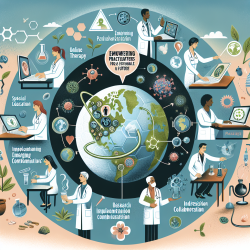In an era where environmental pollution is escalating due to rapid global development, the introduction of new substances poses a significant threat to both human and planetary health. The research article "Emerging contaminants: A One Health perspective" underscores the importance of adopting a One Health approach to address these challenges. As practitioners in the field of special education and online therapy services, it is crucial to integrate these insights into our practice to foster a sustainable future.
Here are key takeaways from the research and actionable steps to implement in your practice:
Understanding Emerging Contaminants
Emerging contaminants (ECs) are newly identified synthetic or naturally occurring chemicals or biological agents that are detected in the environment and potentially hazardous to humans and ecosystems. These include pharmaceuticals, personal care products, industrial chemicals, micro/nano plastics, and antibiotic resistance genes. Understanding the sources and impacts of ECs is the first step towards mitigating their risks.
Adopting a One Health Approach
The One Health approach recognizes the interconnectedness of human health, animal health, and the environment. By leveraging expertise from various fields such as medicine, veterinary science, environmental science, and public health, integrated approaches can reduce risks linked to ECs and enhance the well-being of all organisms.
Implementing Research Outcomes
- Monitoring and Detection: Utilize advanced analytical techniques such as high-resolution mass spectrometry (HRMS) to detect and analyze ECs in environmental samples. This will help in identifying the sources and understanding the distribution and fate of these contaminants.
- Risk Assessment: Conduct comprehensive risk assessments to understand the potential health impacts of ECs. This includes evaluating the exposure pathways and the toxicological effects on humans and ecosystems.
- Interdisciplinary Collaboration: Foster collaboration among different sectors to develop innovative solutions for managing ECs. This includes integrating green chemistry principles into production processes to eliminate hazardous materials from global supply chains.
- Educational Reforms: Advocate for educational reforms to prepare future generations to effectively address environmental and health crises. This includes incorporating environmental science and sustainability into the curriculum.
Encouraging Further Research
While significant progress has been made in understanding and managing ECs, there is still much to learn. Encouraging further research in this area is essential to developing more effective strategies for mitigating the risks associated with ECs. Practitioners can contribute by participating in interdisciplinary research projects, staying updated with the latest scientific developments, and advocating for policies that support sustainable pollution management practices.
To read the original research paper, please follow this link: Emerging contaminants: A One Health perspective.










